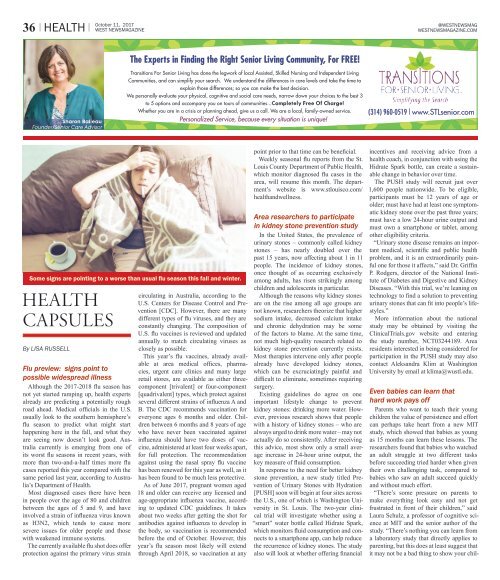West Newsmagazine 10-11-17
Local news, local politics and community events for West St. Louis County Missouri.
Local news, local politics and community events for West St. Louis County Missouri.
Create successful ePaper yourself
Turn your PDF publications into a flip-book with our unique Google optimized e-Paper software.
36 I HEALTH I<br />
October <strong>11</strong>, 20<strong>17</strong><br />
WEST NEWSMAGAZINE<br />
@WESTNEWSMAG<br />
WESTNEWSMAGAZINE.COM<br />
The Experts in Finding the Right Senior Living Community, For FREE!<br />
Sharon Balleau<br />
Founder/Senior Care Advisor<br />
Transitions For Senior Living has done the legwork of local Assisted, Skilled Nursing and Independent Living<br />
Communities, and can simplify your search. We understand the differences in care levels and take the time to<br />
explain those differences; so you can make the best decision.<br />
We personally evaluate your physical, cognitive and social care needs, narrow down your choices to the best 3<br />
to 5 options and accompany you on tours of communities...Completely Free Of Charge!<br />
Whether you are in a crisis or planning ahead, give us a call. We are a local, family-owned service.<br />
Personalized Service, because every situation is unique!<br />
(314) 960-0519 | www.STLsenior.com<br />
Some signs are pointing to a worse than usual flu season this fall and winter.<br />
health<br />
Capsules<br />
By LISA RUSSELL<br />
Flu preview: signs point to<br />
possible widespread illness<br />
Although the 20<strong>17</strong>-2018 flu season has<br />
not yet started ramping up, health experts<br />
already are predicting a potentially rough<br />
road ahead. Medical officials in the U.S.<br />
usually look to the southern hemisphere’s<br />
flu season to predict what might start<br />
happening here in the fall, and what they<br />
are seeing now doesn’t look good. Australia<br />
currently is emerging from one of<br />
its worst flu seasons in recent years, with<br />
more than two-and-a-half times more flu<br />
cases reported this year compared with the<br />
same period last year, according to Australia’s<br />
Department of Health.<br />
Most diagnosed cases there have been<br />
in people over the age of 80 and children<br />
between the ages of 5 and 9, and have<br />
involved a strain of influenza virus known<br />
as H3N2, which tends to cause more<br />
severe issues for older people and those<br />
with weakened immune systems.<br />
The currently available flu shot does offer<br />
protection against the primary virus strain<br />
circulating in Australia, according to the<br />
U.S. Centers for Disease Control and Prevention<br />
[CDC]. However, there are many<br />
different types of flu viruses, and they are<br />
constantly changing. The composition of<br />
U.S. flu vaccines is reviewed and updated<br />
annually to match circulating viruses as<br />
closely as possible.<br />
This year’s flu vaccines, already available<br />
at area medical offices, pharmacies,<br />
urgent care clinics and many large<br />
retail stores, are available as either threecomponent<br />
[trivalent] or four-component<br />
[quadrivalent] types, which protect against<br />
several different strains of influenza A and<br />
B. The CDC recommends vaccination for<br />
everyone ages 6 months and older. Children<br />
between 6 months and 8 years of age<br />
who have never been vaccinated against<br />
influenza should have two doses of vaccine,<br />
administered at least four weeks apart,<br />
for full protection. The recommendation<br />
against using the nasal spray flu vaccine<br />
has been renewed for this year as well, as it<br />
has been found to be much less protective.<br />
As of June 20<strong>17</strong>, pregnant women aged<br />
18 and older can receive any licensed and<br />
age-appropriate influenza vaccine, according<br />
to updated CDC guidelines. It takes<br />
about two weeks after getting the shot for<br />
antibodies against influenza to develop in<br />
the body, so vaccination is recommended<br />
before the end of October. However, this<br />
year’s flu season most likely will extend<br />
through April 2018, so vaccination at any<br />
point prior to that time can be beneficial.<br />
Weekly seasonal flu reports from the St.<br />
Louis County Department of Public Health,<br />
which monitor diagnosed flu cases in the<br />
area, will resume this month. The department’s<br />
website is www.stlouisco.com/<br />
healthandwellness.<br />
Area researchers to participate<br />
in kidney stone prevention study<br />
In the United States, the prevalence of<br />
urinary stones – commonly called kidney<br />
stones – has nearly doubled over the<br />
past 15 years, now affecting about 1 in <strong>11</strong><br />
people. The incidence of kidney stones,<br />
once thought of as occurring exclusively<br />
among adults, has risen strikingly among<br />
children and adolescents in particular.<br />
Although the reasons why kidney stones<br />
are on the rise among all age groups are<br />
not known, researchers theorize that higher<br />
sodium intake, decreased calcium intake<br />
and chronic dehydration may be some<br />
of the factors to blame. At the same time,<br />
not much high-quality research related to<br />
kidney stone prevention currently exists.<br />
Most therapies intervene only after people<br />
already have developed kidney stones,<br />
which can be excruciatingly painful and<br />
difficult to eliminate, sometimes requiring<br />
surgery.<br />
Existing guidelines do agree on one<br />
important lifestyle change to prevent<br />
kidney stones: drinking more water. However,<br />
previous research shows that people<br />
with a history of kidney stones – who are<br />
always urged to drink more water – may not<br />
actually do so consistently. After receiving<br />
this advice, most show only a small average<br />
increase in 24-hour urine output, the<br />
key measure of fluid consumption.<br />
In response to the need for better kidney<br />
stone prevention, a new study titled Prevention<br />
of Urinary Stones with Hydration<br />
[PUSH] soon will begin at four sites across<br />
the U.S., one of which is Washington University<br />
in St. Louis. The two-year clinical<br />
trial will investigate whether using a<br />
“smart” water bottle called Hidrate Spark,<br />
which monitors fluid consumption and connects<br />
to a smartphone app, can help reduce<br />
the recurrence of kidney stones. The study<br />
also will look at whether offering financial<br />
incentives and receiving advice from a<br />
health coach, in conjunction with using the<br />
Hidrate Spark bottle, can create a sustainable<br />
change in behavior over time.<br />
The PUSH study will recruit just over<br />
1,600 people nationwide. To be eligible,<br />
participants must be 12 years of age or<br />
older; must have had at least one symptomatic<br />
kidney stone over the past three years;<br />
must have a low 24-hour urine output and<br />
must own a smartphone or tablet, among<br />
other eligibility criteria.<br />
“Urinary stone disease remains an important<br />
medical, scientific and public health<br />
problem, and it is an extraordinarily painful<br />
one for those it affects,” said Dr. Griffin<br />
P. Rodgers, director of the National Institute<br />
of Diabetes and Digestive and Kidney<br />
Diseases. “With this trial, we’re leaning on<br />
technology to find a solution to preventing<br />
urinary stones that can fit into people’s lifestyles.”<br />
More information about the national<br />
study may be obtained by visiting the<br />
ClinicalTrials.gov website and entering<br />
the study number, NCT03244189. Area<br />
residents interested in being considered for<br />
participation in the PUSH study may also<br />
contact Aleksandra Klim at Washington<br />
University by email at klima@wustl.edu.<br />
Even babies can learn that<br />
hard work pays off<br />
Parents who want to teach their young<br />
children the value of persistence and effort<br />
can perhaps take heart from a new MIT<br />
study, which showed that babies as young<br />
as 15 months can learn these lessons. The<br />
researchers found that babies who watched<br />
an adult struggle at two different tasks<br />
before succeeding tried harder when given<br />
their own challenging task, compared to<br />
babies who saw an adult succeed quickly<br />
and without much effort.<br />
“There’s some pressure on parents to<br />
make everything look easy and not get<br />
frustrated in front of their children,” said<br />
Laura Schulz, a professor of cognitive science<br />
at MIT and the senior author of the<br />
study. “There’s nothing you can learn from<br />
a laboratory study that directly applies to<br />
parenting, but this does at least suggest that<br />
it may not be a bad thing to show your chil-

















